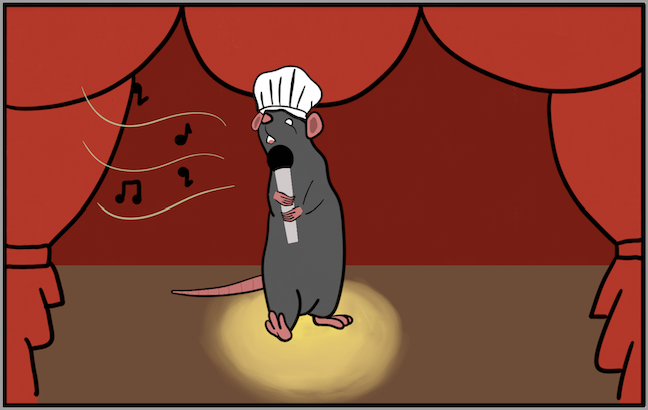The first musical of its kind, Ratatouille: The TikTok Musical served up a delicious community-baked Broadway treat this January. Based on the Disney-Pixar 2007 film Ratatouille, the project began last year on Aug. 10 when TikTok user Emily Jacobsen posted a TikTok of her squeaking out a high-pitched ode to Remy, the film’s rat protagonist. A few months later, on Oct. 19, composer Daniel J. Mertzlufft adapted the song, adding orchestration to create a full-blown musical finale. The idea grew from a simple meme to a creative prompt—hundreds of theatre-minded creatives followed with their own songs, dance choreographies, stage sets, lighting designs, costume ideas, puppets, and even theoretical playbill designs.
Some particularly outstanding songs were those written by Gabbi Bolt, such as “Trash Is Our Treasure,” (and its tragic reprise) for Django, Remy’s father. Bolt was also easily matched by the songwriting superpower of 17-year-old Blake Rouse, who astounded with multiple compositions such as the “Finale,” an upbeat number for Remy’s brother Emile, “The Rat’s Way of Life,” and the electrifying, tension-filled “Colette’s Tango,” featuring a pas-de-deux between the fiery Colette Tatou and the clumsy Alfredo Linguini. Many other artists and composers contributed to the musical repertoire, most notably Sophia James, RJ Christian, Nathan Fosbinder, and Katie Johantgen, among countless others.
But they weren’t alone. The project quickly enticed many Broadway superstars, including the likes of Dear Evan Hansen‘s Andrew Barth Feldman and Hollywood veteran Kevin Chamberlin. Only a few days after graphic designer Jessie Siswick posted her playbill, the company itself reached out to her and requested to repost it on their website. A few hours later, Disney and Pixar tweeted it. Two days after Disney’s tweet, two-time Tony-award-winning Broadway producer Ken Davenport posted a TikTok expressing his interest in producing the musical on the big (computerized) stage.
Just like that, an idea that started as a joke and simmered as a community project of creatives from around the world had dished out the first virtual, TikTok-produced, Broadway spectacle ever made. The performance was streamed on TodayTix.com from Jan. 1-4, and even had an encore performance, raising a total of two million dollars for The Actors Fund. As such, Ratatouille: The TikTok Musical served the industry in two ways—as an entertainingly delightful production for musical-deprived drama lovers everywhere, and as a revolutionary work of theatre.
Broadway has always been a cutthroat industry. It is not unheard of for actors seeking a paying career to attend top-tier performing arts academies or conservatories, relocate to New York City, and spend years of their life and exorbitant sums of money for a chance to step foot into the audition room. Even with experience under their belt, only 10 per cent of musical theatre performers get cast.
The multi-million-dollar success of Ratatouille: The TikTok Musical has demonstrated, to some extent, the gratuitous needlessness of these institutions. Performers of many ages, backgrounds, and levels of training were able to collaborate on a musical from the comfort of their own homes thousands of miles across the globe.
Already, artists are working away on a Bridgerton musical that similarly started as a joke posted by creators Abigail Barlow and Emily Bear. It quickly gained the attention of choreographers, singers, songwriters, graphic designers, and intimacy directors—ultimately being picked up by the BBC and Playbill just thirteen days later. Had Ratatouille: The TikTok Musical not been the magnanimous, unforeseen sensation it had been, there would absolutely not be the same level of trust in small creators to produce a musical.
If Ratatouille: The TikTok Musical has done one thing, it has reminded us that at its core, success in musical theatre does not, and should not, depend on the dog-eat-dog institutions from which it is born, but rather on the radical joy of community, grassroots art-making. After all, as Chef Gusteau always said, “Anyone can cook.”








